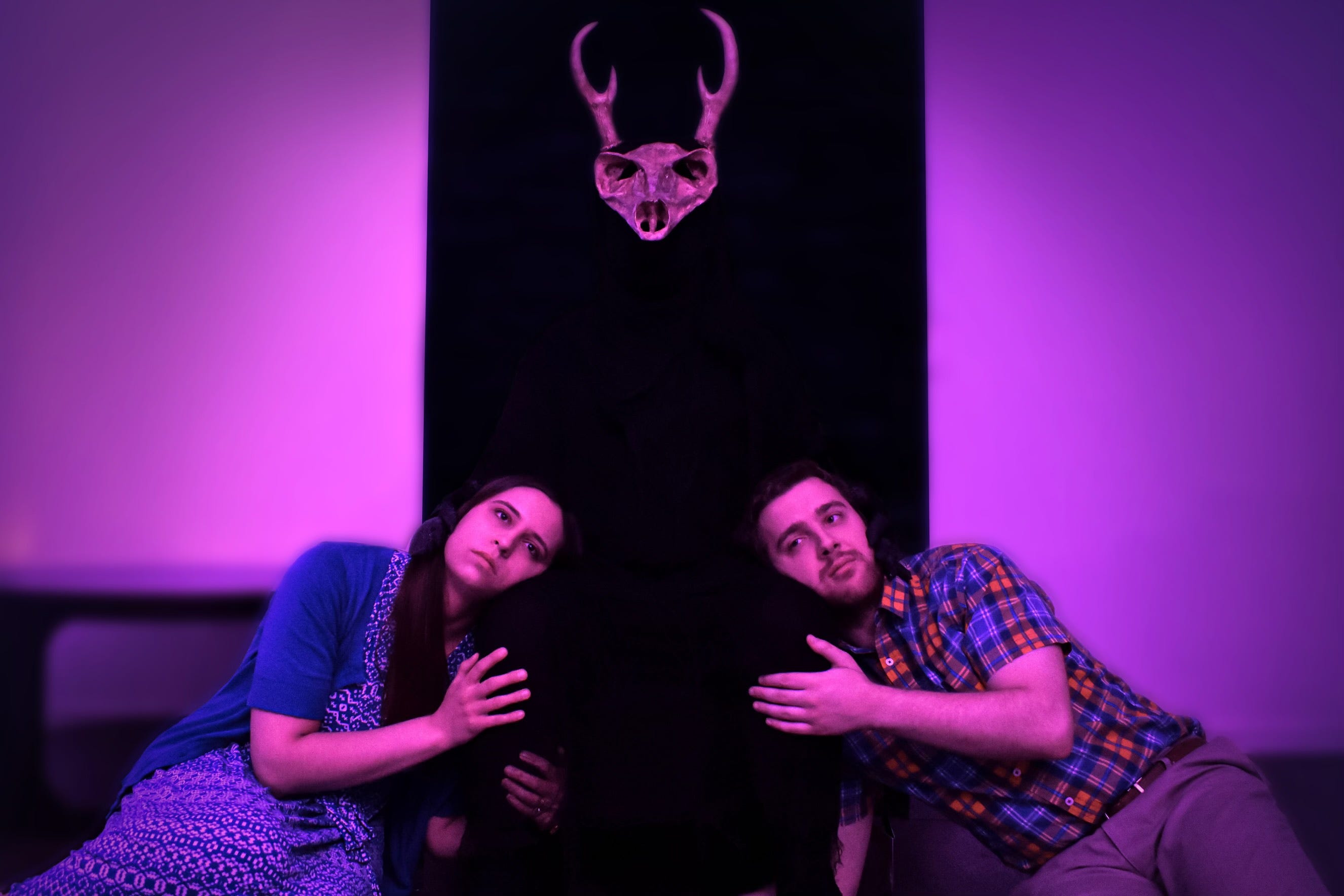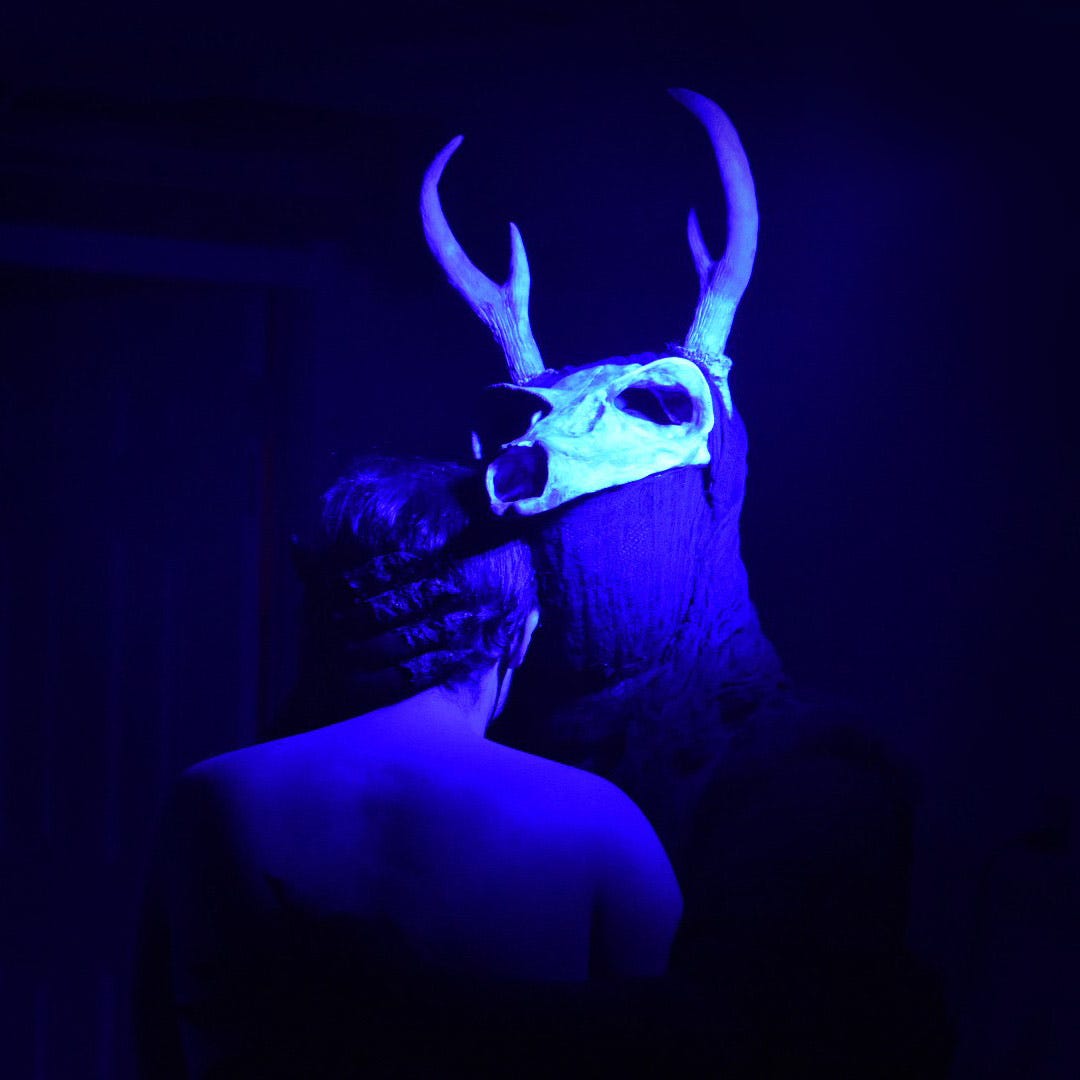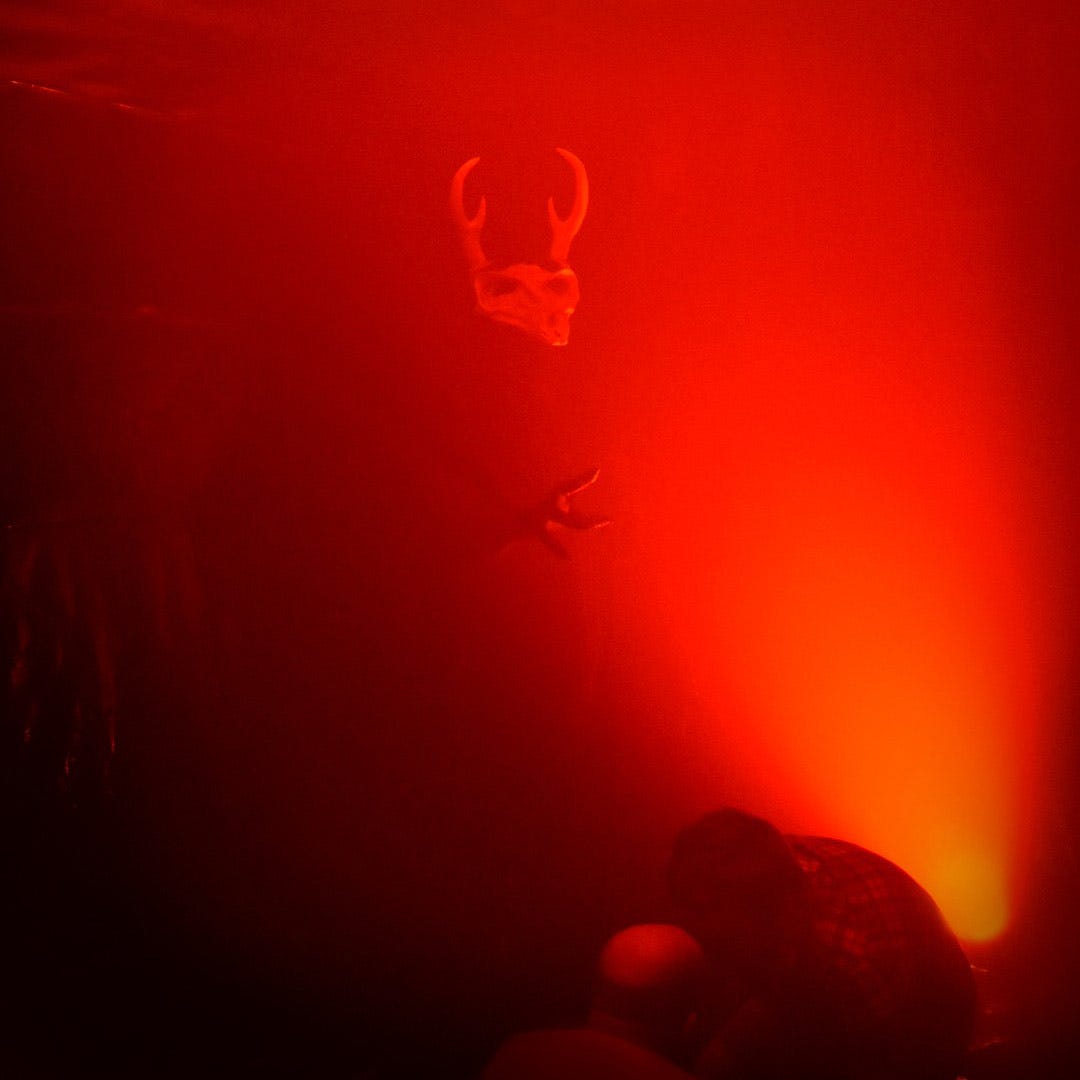The Long Road To Longmont: Paralysis’ ‘Omega’ Brings Immersive Horror To Colorado (FEATURE)
An in-depth look at an intense, intimate production


Editor’s note: the material ahead, which concerns an immersive horror production, discusses depictions of domestic violence and what can be interpreted as self harm. Reader discretion is advised.
In the hours, days and weeks that have followed my 45-minute solo horror experience at Omega this March, I have played the scenes over and over in my head trying to sort it all out.
The experience had managed to make an impact on me emotionally (by allowing me to create intense relationships with the characters quickly), spiritually (by using polarizing religious content), and physically (by punctuating the story with high-touch, sensory elements that left an imprint on my mind like no other show ever has.)
Applications for tickets to Omega opened in December of 2022. Along with the requests for contact information, the application made me aware of the show’s content warnings, and asked about my level of familiarity with immersive entertainment. Then there were the open ended questions like, “What role does faith play in your life?” and “Do you ever feel like you’re being watched?” There were questions about physical and mental health conditions, asking for full transparency in a stated interest for my safety.
Despite the intimate questions and obligation to obtain “approval” to buy tickets, nearly 40 people applied. Those of us who were approved were notified two weeks later. A month after that, just 16 tickets went on sale, and with very little advance notification or promotion. Brimming with curiosity and excitement, I did not hesitate to hand over $150 to secure my spot at this immersive horror experience for one.

Starting The Journey Early
I’ve received my fair share of well-themed pre-show emails in the past, but I’ve never been so fully exposed to a story so far in advance of the actual event. I have previously written about thoughtful on-boarding as a prerequisite for a transformative experience, and Omega more than cleared that hurdle.
After purchasing my ticket and craving more information, I was left in the dark for a month until an envelope showed up in my mailbox. That envelope contained a double-sided letter with fictitious religious scripture — perhaps the antithesis of The Lord’s Prayer? — and a large, narrow, equal-armed cross with crescent moons at each end. It also contained a plastic baggie with two alcohol swabs and two lancet needles, and a number to text to set up a meeting.
Several days later, I would use all of these things, plus a candle and lighter, to conduct a ritual at home by myself in the dark. With the lit candle sitting at the center of the cross on the letter, guided by a mysterious being on the other end of a live phone call, I used the lancet needle to poke the tip of my finger.
“Hard. And fast,” the voice commanded.
I drew a drop of blood, which I then rubbed on each crescent moon in the symbol before reciting the fictitious scripture from the paper. I’d suspected I might be using the device to draw blood from the moment I opened the envelope, but it was still thrilling when the moment finally arrived and that’s what I was told to do.
“Okaaay, it’s going to be like that,” I thought to myself as I dug the tiny, harmless needle into my skin and watched a bead of blood pool on my fingertip.
For two more weeks, I was again left in the dark, pondering the ritual and its meaning — and how it might tie into the looming live event. And then, a week and a half before the show, a pivotal email arrived. I was addressed as a sinner for my previous attempt to communicate with the dead via the ritual I’d conducted, which the email author had heard about “from a concerned neighbor.”
“Thanks to your phone records and text conversations, we were able to locate and mete out punishment to the unrepentant witch who led you from our flock. Though they were irredeemable, and thus were rightly exterminated in the eyes of the LORD, HE put it on our hearts to offer you a chance at salvation,” the email told me.
It proceeded to inform me that, as a result of my behavior, I had been registered for “mandatory home rehabilitation” in Longmont, CO and I would be receiving more instructions soon. This email had a profound effect on me. Not only was I being accused of being caught red-handed attempting to communicate with the dead, but the ominous subtext of the message set my mind to work about the possibilities ahead, slowly and silently building anticipation inside of me.
My final instructions were to arrive at a residential intersection in Longmont, CO five minutes before my appointment, and then to text my Federal Council of Faith and Sanctity Enforcer — who I’d never heard of or met before — at the number provided. When I sent the message, they replied with a nearby address and gave me further instructions for arriving on foot, including a photo of the house with an arrow pointing to the entrance of the backyard where I would enter.
When I arrived, the Enforcer was waiting, standing at attention with their face fully obscured by a black mesh mask. They took my phone, checked my ID, and gave me a waiver, all while ridiculing me for my bad life choices and telling me how lucky I am to be accepted into this couple’s home.
With all that complete, they led me to the back deck, where I removed my shoes and was let inside a dark room lit only by the moonlight spilling in through the open door behind me. It was just enough to see a tall dark figure wearing the skull of an antlered animal looming a few feet in front of me. They slowly approached and drew me into an embrace. The scent of earthy, masculine essential oils washed over me as I inhaled long, deep breaths of air against my racing heart. And just like that, the experience had begun.

Building Trust
This thorough and exquisitely detailed onboarding experience — from the application submission all the way up to the start of the experience — did more than just build narrative, though it also did a lot of that.
For one, it layered in early exposure to the type of event I was signed up for, such as using the lancet needle to draw my own blood for the ritual. It also eased into the slightly world-breaking, but utterly necessary, list of rules and expectations that guests were agreeing to abide by in attending Omega. Repetition over time with mounting specificity created a perfect blend of subtle mystique and meticulously planned details that instilled a sense of trust in whoever was guiding me. I was headed into intense territory, but I was going in with my eyes open.
There were still a lot of unknowns floating around in my head as I made the drive up to Longmont that Friday night, but those all pertained to the context of the story and my forthcoming rehabilitation. What I did know was exactly where to be and when, what I was and was not supposed to be wearing, what I was and was not supposed to bring with me, and I had a really solid idea of the ways that the cast might be physically engaging with me during the show.
A sense of trust started forming long before I arrived, too. The application served as a necessary way of curating the audience, of filtering out folks who might be offended or triggered by the content of the experience. Setting these expectations early not only ensured I was a good fit for the experience mentally and emotionally, it also, to my mind, reinforced what I saw as the production’s commitment to physical safety for both actors and participants.
When I spoke to the Paralysis Immersive team days after Omega concluded, theatrical Director Quinn Leary said, “We want to make sure that we are creating an environment where our guests can give themselves freely to the experience without having to fear for their safety, because that only creates a barrier between you and the ability to lean in and let yourself have the right kind of fear in these kinds of shows.”
Whether it’s a bad knee that requires extra tenderness, dietary restrictions on what you can consume, or anything in between, Executive Producer Sam Delacruz agrees, adding that they’re not looking to exclude anyone from the experience if they feel that they are an emotional fit for the narrative.
I point out that it must be a lot easier to screen for physical conditions than for emotional or spiritual fit. Paralysis Founder & Creative Director David Higgins agrees, and adds that while half of the fun of a show like this is the uncertainty and mystery surrounding it, it’s important for guests to speak up and share with the producers if they have trauma around triggering topics or any kind of concern whatsoever. When these potential triggers are brought up in the application process, the team can then reach out to the applicant to set more specific expectations for that guest and confirm whether or not they still feel like a good fit.
“Secrecy is dumb,” David said matter of factly. “It’s a cheap trick that can be weaponized against guests and that’s not at all what we want to do.”

Paralysis’ Origins
All three members of Paralysis met in 2019 while dabbling in Chicago’s burgeoning immersive theatre scene as actors, producers and enthusiasts.
David points to the “surreal aesthetic choices” of Birch House and the way they “really take you for a ride on these emotional character arcs,” as a huge source of creative inspiration for Paralysis.
Around the same time, David and Sam were also attending extreme immersive horror events by Miasma, and Sam even had the chance to act with them for a private show.
Get Danielle Riha’s stories in your inbox
Join Medium for free to get updates from this writer.
SubscribeSubscribe
“They run a really tight ship,” she said. “They take safety very seriously. As somebody who really thinks more about things like logistics and planning and the strategy of a whole show, I’m just so inspired by the level of professionalism that show runs with.”
She went on to talk about how Miasma was influential in forming her own opinions about the way actors should be treated, guests should be treated, and safety should be considered.
“They’re a phenomenal group to learn from,” she concluded.
Sam and Quinn had also been around to experience major shifts in the Chicago theatre scene in the wake of the late-2017 publishing of the Chicago Theater Standards (also known as Not In Our House) and carried many of those principles into Paralysis.
Quinn explains, “We thought it was really important to take a solid theater standard and use that as our foundation. So we highlighted some specific elements from the guide that we believe are most applicable to the kind of theatre that we create. Our focus is always making sure that actors and guests are safe and feel that they’ve been adequately prepared for their experience. This informs our process from the structuring of our guest screening all the way through to stunt testing, handling, production and aftercare.”
A crucial element of their approach is attempting to account for every possible way someone might interpret an instruction, move in a space, or respond to a touch. Sam points to her experience with Miasma as opening her eyes to the responsibility they take on in making high-risk work like this.
“You see a couple of really drastically different ways that people can respond to what you’re expecting and then based on those, you kind of just have to think, ‘What’s the least intuitive thing to me that could happen here?’”
As an example, David points to the bathroom scene in Omega where there is a depiction of domestic violence as the husband chokes his wife. The intention was to have the guest watch as it happens from a corner of the room, behind the door. They wondered if a “good samaritan” might step up and try to save the wife from her husband.
“If they rush out and try to stop it, we’re moving into some wildly unpredictable, unsafe territory,” he said.
Their solution was for the guest to be given a verbal instruction (“You must watch.”) by a third character while also having that actor physically block the guest from being able to leave the corner of the room.
David says it’s a matter of looking for things like that every step of the experience and asking, “What might a guest do?”
“We just have to think about all those different possibilities as we test and think of ways to make our instructions more and more specific to be sure that we are controlling for as many variables as humanly possible.”
Sam adds, “And account for people who don’t take direction as given, without ruining the experience. Making sure that actors are prepared to give clarification, or to handle a situation that they’re not necessarily expecting. Because we don’t ever want our actors to feel uncomfortable with the people that they’re handling, or feel that they’re not in control of the situation.”

“Extreme” Immersive Horror
I put The E Word in quotation marks because when I reflect back on Omega, in the end, it really wasn’t all that extreme. The Paralysis team prefers to use the word “challenging” when describing the nature of their experiences.
“We aren’t trying to be 10/10 the most physically extreme experience at all,” Sam says. “The word ‘extreme’ conjures some associations that we’re not trying to even end up in the same ballpark as.”
Quinn adds, “From some of the feedback we’ve received, there are a number of people who came with an expectation for more pain and found a really connective, emotional experience. I really like being able to subvert someone’s expectations in a very positive way while also making sure people understand where we live within the cosmos of ‘high-touch, full-contact experiences’ and immersive theatre in general. We operate somewhere in the middle.”
I won’t go into detail about the specific scenes, how the story played out once I arrived, or how the interactive elements were used. That’s largely because the ephemeral nature of this event, plus all the mystery and personalization that came along with it, is a big part of what made it so special for me, the other 15 guests, and five staff members who experienced it. I think it’s important to protect that, for the guests and for the creators of Omega.
But as I said in my capsule report earlier this month, the “extreme” aspects of the performance were never the point to begin with; the story that I was living out in that troubled home, was. Those exclamation points on the narrative allowed me the opportunity to feel — not pretend to feel — what was happening, and those moments continue to repeat in my mind with insane vividness.
As many of us immersive junkies — horror fans or not — feel, the best productions have a story that’s uncomplicated, relatable, and progresses in some tangible way. That’s exactly what happened in the 45 minutes I spent with the production’s three actors.
So, no — Paralysis isn’t “McKamey Manor done right” or anything at all like extreme horror events where participants come out with bruises and scratches, or dripping with fake blood and mysterious goo. The goal is not to make participants so terrified and actually afraid of real harm that they need to use the safe word, either. Although there is one.
At the end of the day, despite all the content warnings about the physically interactive elements of the show, this was no more than a really creative and interactive way to tell a very dark, very emotional story — a story that David says is reflective of his own journey and emotional struggles in life.
“I just had a lot of questions about who I was as a person — who I wanted to be — and had a lot of questions about some of the things that I was raised to believe and found myself with a lot of really difficult emotions around that. For Omega, I was trying to find a story that would reflect that in a challenging, but hopefully also a positive way.”
He says a key inspiration for the story was to create the antithesis to the traditional Christian hell house, which was a popular attraction where he grew up in the South.
“I thought that was a really manipulative way to get people to subscribe to your teachings and thought, what if we did the opposite of that?”
Not having to contend with other participants for a good vantage point or for interaction with the actors was the closest I’ve ever come to feeling like a character in a horror movie. And while the experience itself was just 45 minutes (and felt like it went by in 20), the well-polished on-boarding experience delivered a truly satisfying amount of additional engagement. If the story of Omega really was a horror movie, what went down in that house in Longmont, CO was only the climax to a story that started building around me, in real life, weeks in advance.
Going into the event as a seasoned immersive participant (but a total n00b to solo “extreme” immersive horror) the only thing I was not prepared for was the freedom to interact with the experience so deeply. In hindsight, I wish I’d have asked more questions and attempted to know the husband and wife more intimately than I already did, even as what I would consider to be a passive audience member.
I did ask some questions, follow all their directions, and felt so consumed by my surroundings that I temporarily forgot about the outside world. But I was also just soaking it all up — really trying to be present — and ultimately in the midst of a completely new way of experiencing a story being told. My fascination with what was happening blinded me to the door they’d left ajar for more dialog and engagement.
I guess I’ll just have to keep my eyes open a little wider next time.
What Comes Next
The Paralysis crew is pretty tight-lipped about what may be in store for the future, other than that there will eventually be more from them. Sam points to a past relationship with creative burnout as a reason for a break before moving on to the next project.
“One of the things that made this show really magical and really fulfilling for all of us was the fact that we were so excited to work on it and collaborate. I think it’s important to be mindful of really caring about the projects that we’re putting out and not just churning out work because people want it on a timeline or because it’s expected of us. I think preserving our care for the shows is so, so important because that’s really what brings the heart to it.”
“Based on the feedback from our guests,” David adds, “there is a longing for a deep, narrative-driven experience in the full-contact immersive horror space. Not everyone wants to get beat up; some people want to be scared and have that really impactful story. There is an audience for that.”
If you fall into that audience, follow Paralysis on Instagram and keep an eye out for future announcements. I promise, you won’t be sorry.
Discover the latest immersive events, festivals, workshops, and more at our new site EVERYTHING IMMERSIVE, new home of NoPro’s show listings.
NoPro is a labor of love made possible by our generous Patreon backers. Join them today!
In addition to the No Proscenium website, our podcast, and our newsletters, you can find NoPro on Facebook, LinkedIn,YouTube, Twitter, Instagram, in the Facebook community Everything Immersive, and on our Patreon Backer exclusive Discord.